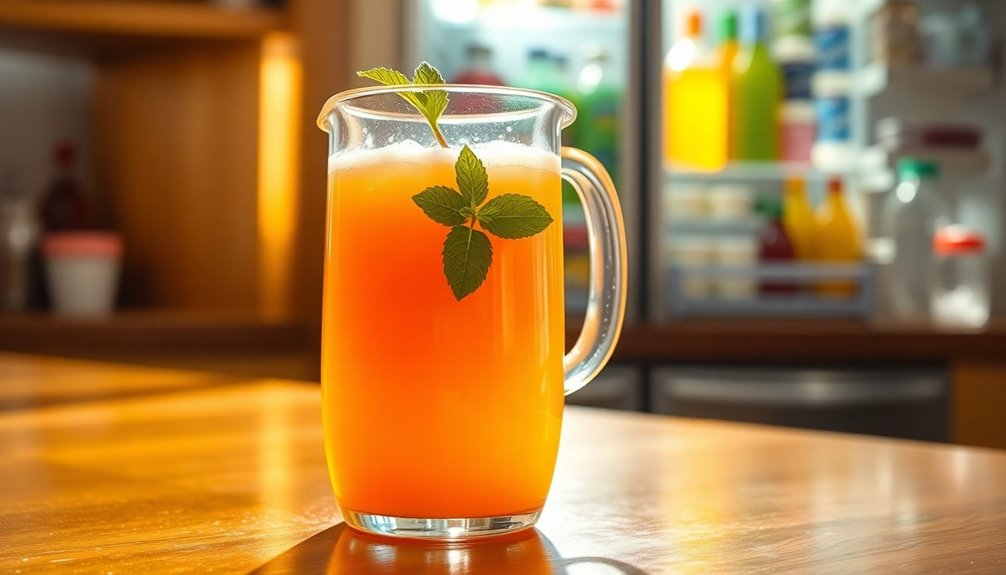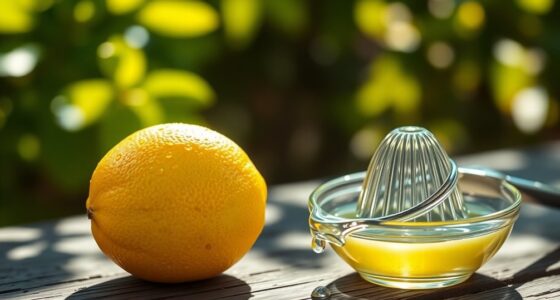Freshly squeezed grapefruit juice lasts about 2-3 days in your fridge. If you buy store-bought juice, it can stay unopened for 1-2 weeks past its 'Best by' date. Once opened, it typically remains fresh for 7-10 days. To keep it safe, store it at 40°F (4°C) or below in airtight containers, and always check for signs of spoilage before you drink it. There's more to know about extending its life and storage tips, so keep exploring!
Key Takeaways
- Freshly squeezed grapefruit juice lasts 2-3 days in the fridge when stored properly.
- Opened store-bought grapefruit juice remains fresh for 7-10 days in the refrigerator.
- Unopened store-bought grapefruit juice can last 1-2 weeks past its 'Best by' date.
- Store grapefruit juice at 40°F (4°C) or below to maintain freshness.
- Signs of spoilage include darker hues, unusual smells, and mold growth; discard if these are present.
Understanding the Shelf Life of Grapefruit Juice

When you consider the shelf life of grapefruit juice, it's essential to understand the factors that influence its freshness and safety.
Pasteurization plays a key role, as it eliminates harmful bacteria, extending the juice's longevity. Many commercial juices contain preservatives like potassium sorbate and sodium benzoate, which further prolong shelf life. Additionally, freshly squeezed juice is more susceptible to spoilage due to natural enzymes that remain active.
Proper storage conditions are crucial too; keeping the juice refrigerated at 40°F (4°C) or below significantly slows spoilage. The use of airtight containers helps prevent contamination and oxidation, preserving freshness.
Grapefruit's natural acidity also aids in inhibiting bacterial growth.
For freshly squeezed juice, remember it lasts only 2-3 days in the fridge, while at room temperature, it spoils in about two hours.
Unopened Store-Bought Juice: What to Expect
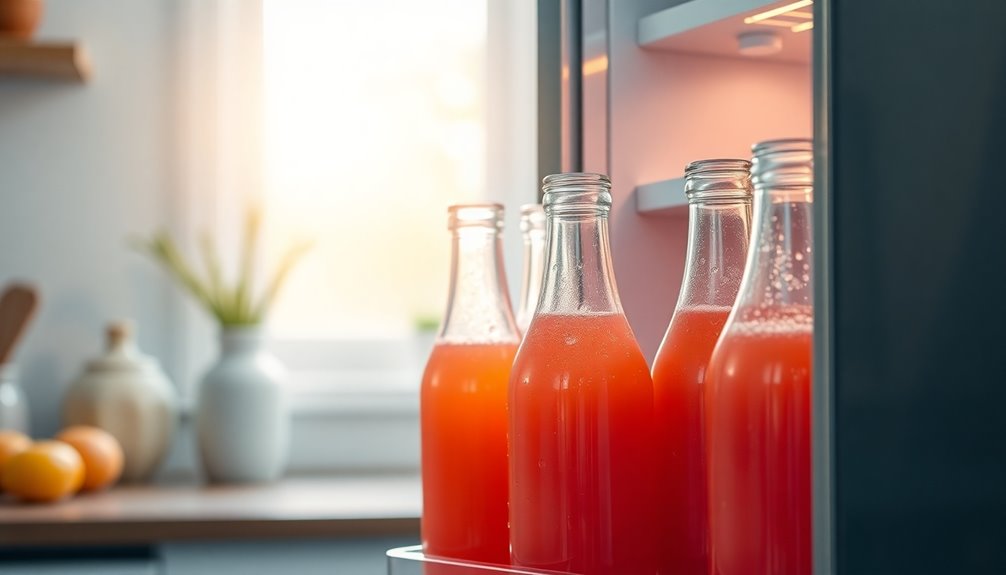
If you've purchased unopened store-bought grapefruit juice, you can expect it to stay fresh and safe for consumption well past its 'Best by' date, as long as it's stored properly.
Keep the juice in the main body of your refrigerator, ideally below 40°F (4°C), away from the door, where temperatures fluctuate. Store it in its original container to maintain quality and minimize light exposure.
Generally, unopened juice can last 1-2 weeks past the date if kept refrigerated and even up to 12 months in a cool, dark place. However, you should always check for signs of spoilage, like off odors or unusual colors, before drinking, ensuring both safety and quality. Remember that the shelf life can vary based on several factors, so always use your senses to assess the juice's condition.
Opened Store-Bought Juice: Freshness Timeline
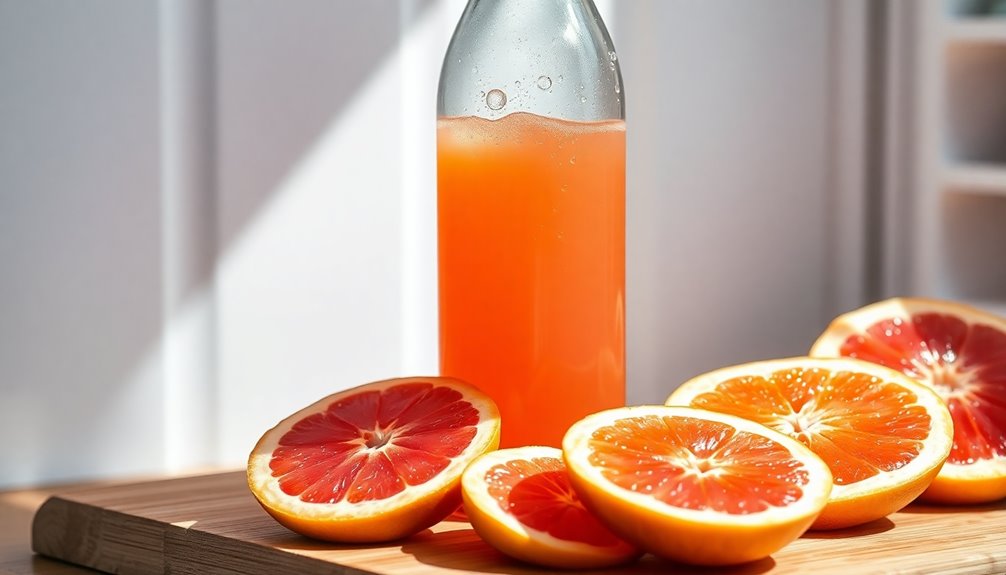
Once you've opened a carton of store-bought grapefruit juice, you can expect it to remain fresh for about 7 to 10 days in the fridge.
To maximize freshness, store the juice in the coldest part of your fridge, ideally near the back. Using an airtight container can further help prevent spoilage by minimizing air exposure. Proper storage helps preserve the nutritional value of the juice and prevents bacterial growth, which is particularly important as routine health checks can help identify potential spoilage indicators.
Always check the expiration date and consume the juice before it expires. Regularly inspect it for signs of spoilage, such as off smells, color changes, or visible mold.
If you notice any sour taste or unusual texture, it's best to discard the juice. Proper handling and storage practices can help you enjoy your grapefruit juice safely and deliciously.
Freshly Squeezed Juice: Shorter Lifespan
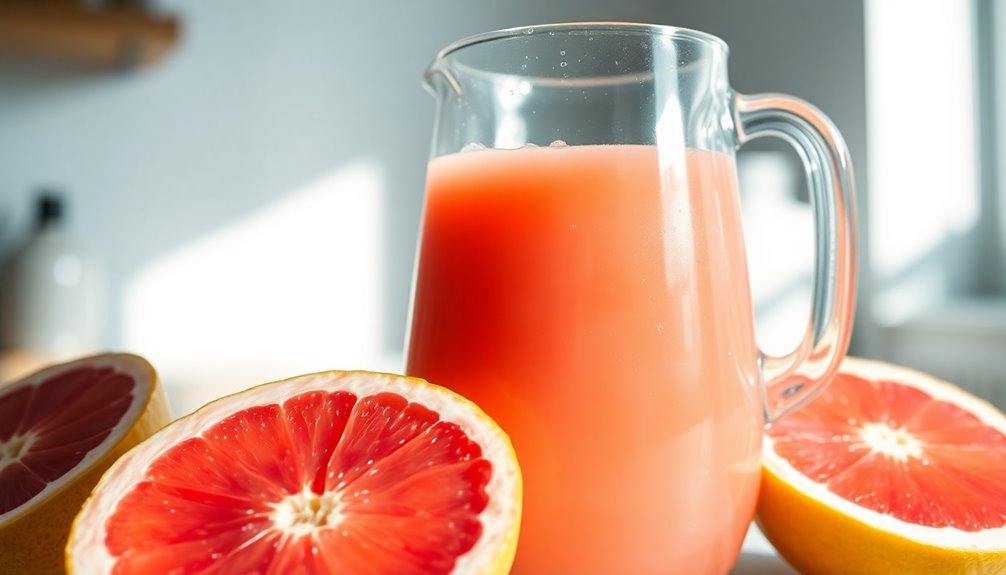
Although freshly squeezed grapefruit juice offers a vibrant taste and nutritional benefits, its shelf life is significantly shorter than that of store-bought varieties. Typically, you can expect it to last only 2 to 3 days in the fridge, thanks to the lack of pasteurization and preservatives. Without these, natural enzymes and bacteria can quickly lead to spoilage. To keep your juice fresh, store it in airtight containers at the back of the fridge, away from light. Proper refrigeration is crucial to slowing bacterial growth and maintaining freshness. Additionally, consuming fresh juice in moderation is essential, as excessive intake may lead to increased acid reflux symptoms in some individuals. Clean handling practices are also important to prevent contamination. For those curious about other fruit juices, grape juice shelf life explained reveals that it typically lasts longer than freshly squeezed options due to the presence of preservatives and pasteurization. While store-bought grape juice can remain fresh for several weeks, freshly pressed grape juice may only last about a week in the fridge under optimal storage conditions. Always check for signs of spoilage, such as off odors or changes in color, to ensure that your juice is safe to consume.
Always check for signs of spoilage, like a sour smell or cloudy appearance. For the best taste and safety, enjoy your freshly squeezed juice within the recommended timeframe.
Freezing Grapefruit Juice: Extending Shelf Life
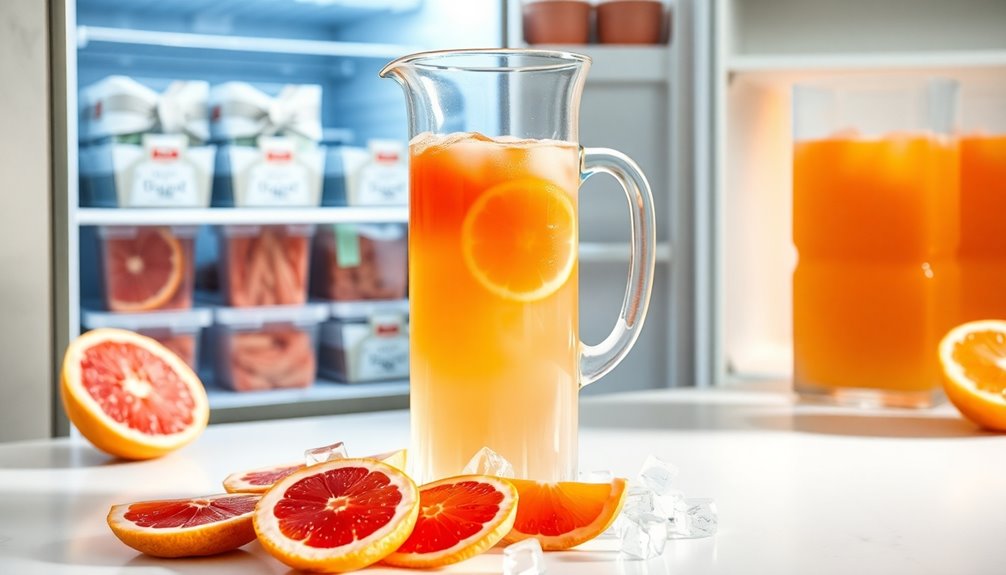
Freezing grapefruit juice not only extends its shelf life but also allows you to enjoy its refreshing taste long after you've squeezed it. You can freeze the juice in airtight containers or freezer-safe bags, keeping it fresh for up to six months. Make sure to choose suitable containers, like plastic or glass, and remember not to overfill them to allow for expansion. Properly storing juice in the freezer contributes to overall food safety. When you're ready to enjoy it, thaw the juice in the refrigerator or by using cold water for quicker results. Label your containers with the freezing date to keep track of storage time. This method reduces waste and preserves nutrients, making it easy to add delicious grapefruit juice to smoothies or cocktails later on.
Key Factors Influencing Juice Freshness
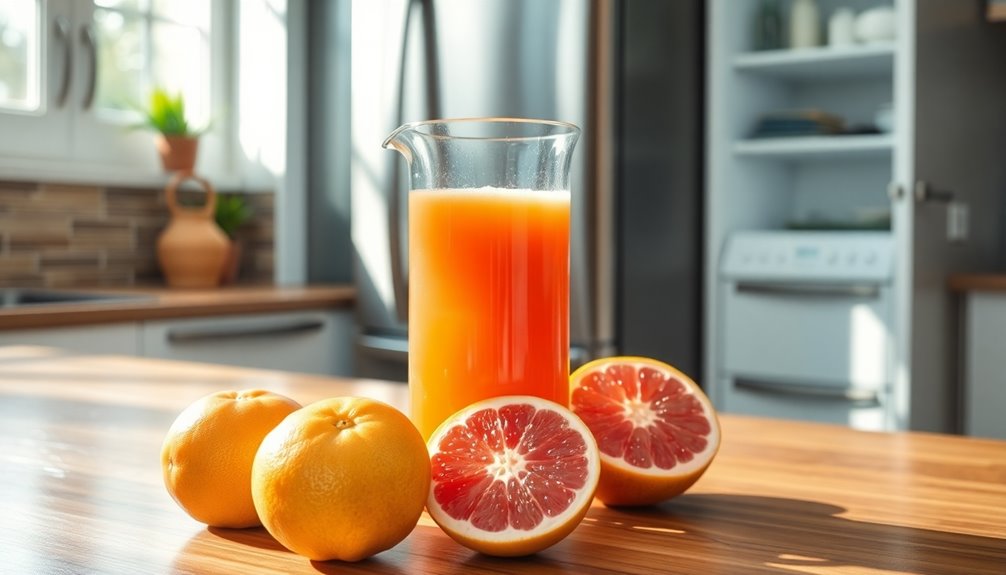
Several key factors influence the freshness of grapefruit juice, ensuring you get the best flavor and quality.
Temperature plays a crucial role; storing your juice at or below 40°F (4°C) slows bacterial growth and helps maintain its taste. Avoid temperature fluctuations to prevent spoilage. Additionally, using high-quality raw materials ensures that your juice retains its optimal flavor and freshness.
Good handling and sanitation practices are equally important. By preparing and packaging juice in sanitary conditions, you minimize contamination and oxidation, extending its shelf life.
Additionally, the quality of raw materials matters—using fresh, ripe, and undamaged fruits results in better-tasting juice. Furthermore, the sourcing of high-quality ingredients not only enhances flavor but also maximizes nutritional value. For instance, choosing the right apples can significantly boost the apple juice vitamin benefits, providing essential nutrients that contribute to overall health. By prioritizing freshness and quality, you ensure that every glass of juice delivers a delicious and healthful experience.
Lastly, preservation methods like pasteurization or natural acidity can inhibit microbial growth, ensuring your juice stays fresh for longer.
Keep these factors in mind to enjoy your grapefruit juice at its best!
Best Storage Practices for Grapefruit Juice
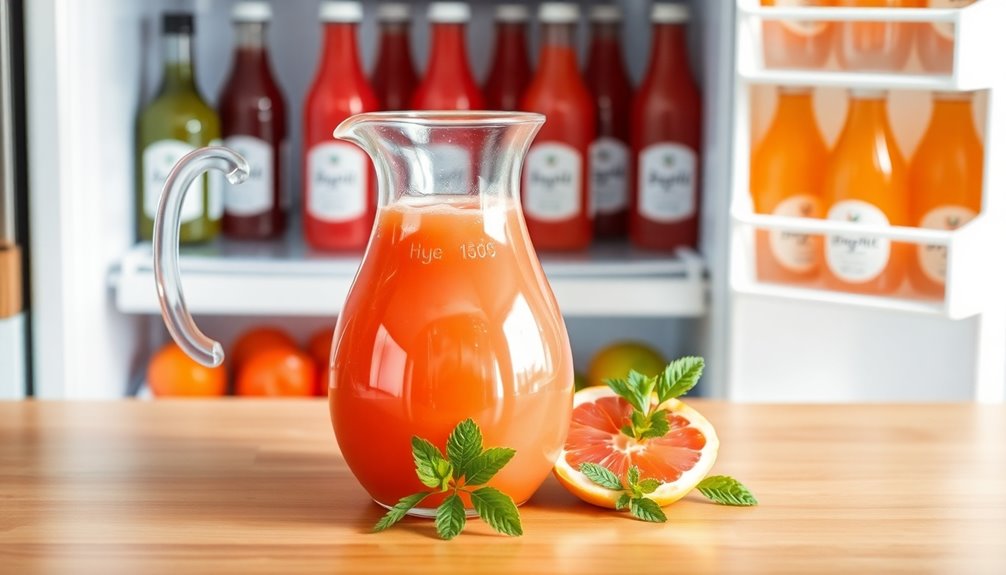
To ensure your grapefruit juice stays fresh and flavorful, it's essential to follow proper storage practices. Store your juice in airtight containers to prevent oxidation and keep it away from direct light to maintain its flavor and nutrients. Aim for a refrigerator temperature of 40°F (4°C) or lower, placing the juice at the back for consistent cold. Always seal containers tightly after use and use clean utensils when handling the juice to avoid contamination. If you've freshly squeezed juice, refrigerate it immediately and label the container with the date. To extend shelf life, consider freezing portions in airtight containers. By minimizing temperature fluctuations, you can enjoy your grapefruit juice longer! Additionally, grapefruit juice is rich in vitamins, making it a nutritious choice when consumed promptly.
Recognizing Signs of Spoilage
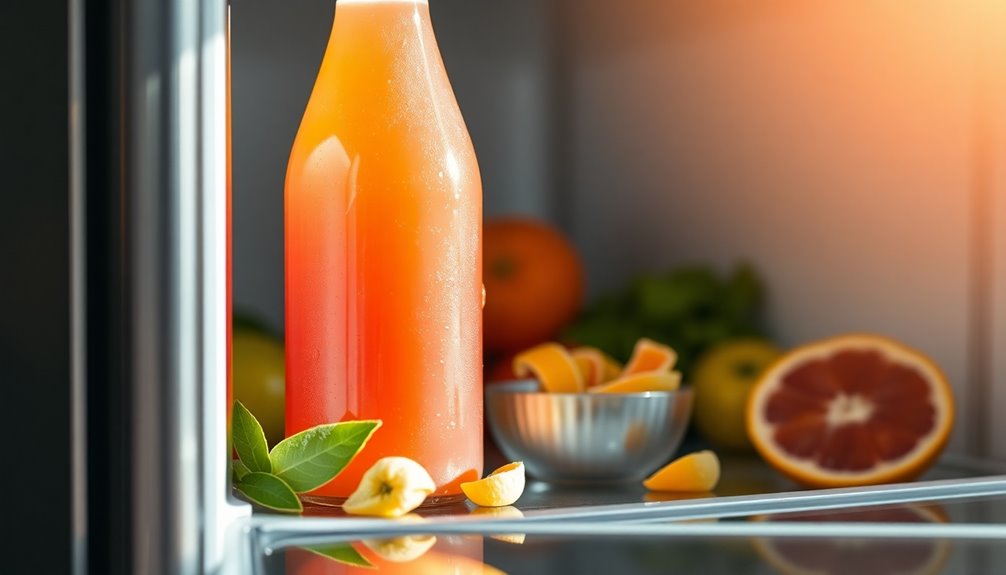
While enjoying your grapefruit juice, it's crucial to recognize the signs of spoilage to avoid any health risks.
Start by checking for visual changes; darker or brownish hues indicate spoilage. If you notice unusual cloudiness or separation, it's best to discard the juice. Look for mold growth, as it's a definitive sign of spoilage. Be alert for bubbling or foamy surfaces, which can signal fermentation.
Pay attention to odor; a sour, musty, or alcoholic smell suggests spoilage. If the taste is overly sour, bitter, or metallic, it's time to toss it out. Remember that grapefruit juice lasts about 7 to 10 days in the fridge after opening, so always check for freshness.
Always trust your senses—if anything seems off, err on the side of caution and avoid consuming spoiled juice. Your health is worth it!
Thawing Grapefruit Juice: Best Methods
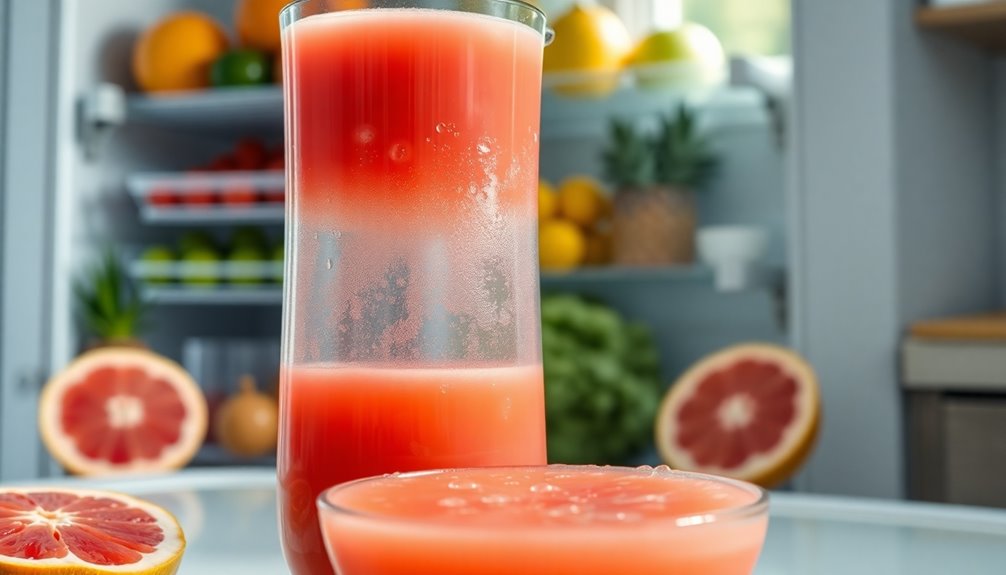
When you need to thaw grapefruit juice, choosing the right method can make a big difference in maintaining its quality. The best approach is to thaw it in the refrigerator, where smaller containers take 4-6 hours, while larger ones may need up to 24 hours. Fruit concentrate is stronger than regular fruit juice, so maintaining its quality during thawing is essential.
If you're short on time, cold water thawing works well—just submerge the container, change the water every 30 minutes, and it should be ready in 1-3 hours. Avoid microwave thawing, as it can alter the juice's taste and texture. Room temperature thawing isn't recommended due to the risk of rapid bacterial growth.
Always plan ahead to ensure you preserve the best flavor and safety of your grapefruit juice.
Health and Safety Considerations for Juice Consumption
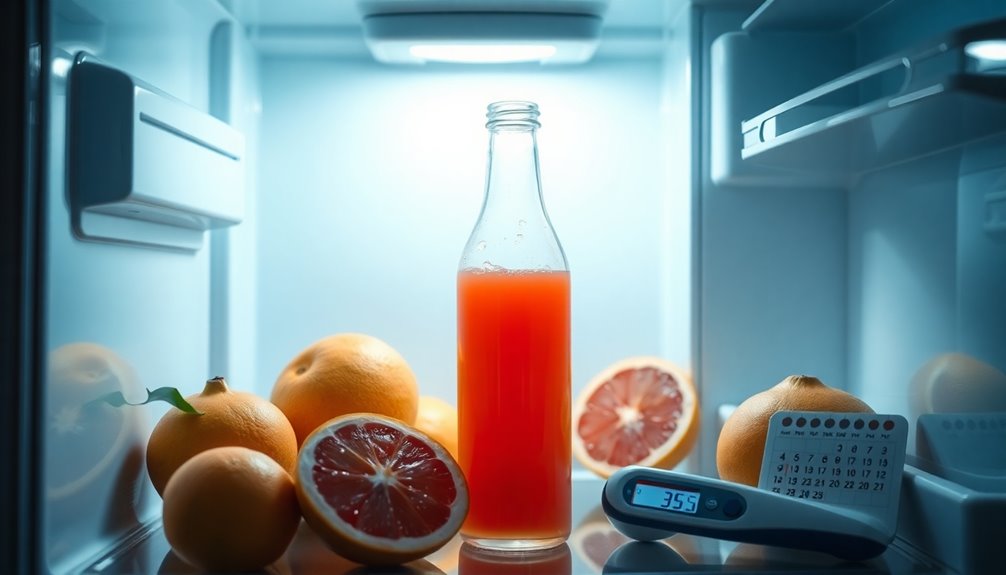
Thawing grapefruit juice properly is only one part of ensuring you enjoy its benefits safely. While juice can provide quick nutrient absorption and support cardiovascular health, be cautious of its high sugar content, which can spike blood sugar levels. Additionally, the nutritional value of juice can vary based on the specific ingredients used, so it's essential to choose your fruits wisely. Consuming fresh juice can also provide important vitamins that contribute to overall health.
To avoid health risks, always store your juice at or below 40°F (4°C) and check for spoilage signs like mold or off smells before consuming. You should also maintain hygiene when handling juice to prevent contamination.
Remember that excessive juice intake can lead to nutrient imbalances, weight gain, and even dental issues. Balance your juice consumption with whole foods to ensure you get essential fiber and protein. Moderation is key for enjoying grapefruit juice healthily!
Frequently Asked Questions
Can I Drink Grapefruit Juice After the Expiration Date?
You can drink grapefruit juice shortly after its expiration date if it's been stored properly and shows no signs of spoilage.
Check for off odors, strange colors, or unusual flavors before consuming. While it might still be safe, the quality and taste may decline over time.
If you're unsure, it's better to discard it.
Always prioritize your health and safety when it comes to consuming expired products.
Does Grapefruit Juice Lose Nutrients Over Time in the Fridge?
Yes, grapefruit juice does lose nutrients over time in the fridge.
If you store it properly, you can slow down this degradation, but factors like light exposure and air can accelerate nutrient loss.
Vitamin C, in particular, is sensitive to heat and oxygen, so keep it in an airtight container away from direct light.
Although it'll still be safe to drink, the nutrient quality may diminish as time goes on.
How Can I Tell if Grapefruit Juice Is Still Good?
Did you know that 70% of people don't know how to tell if their juice is still good?
To check if your grapefruit juice is fresh, look for signs like mold, bubbles, or an expanded container. A sour smell or off-taste indicates spoilage.
If it's cloudy, it might still be fine, especially if freshly squeezed. Always trust your senses—if something feels off, it's better to toss it than risk your health!
Can I Mix Grapefruit Juice With Other Juices for Storage?
Yes, you can mix grapefruit juice with other juices for storage.
Combining juices can create interesting flavors and enhance nutritional benefits.
Just make sure to store the mixture in airtight containers to prevent spoilage.
Keep the juice refrigerated at or below 40°F (4°C) and check for any signs of spoilage before drinking.
If you want to extend its shelf life, consider freezing the mixed juice in appropriate containers.
Is There a Difference Between Bottled and Carton Grapefruit Juice Storage?
When it comes to grapefruit juice storage, think of bottled and carton options as two dancers in a tango, each with its own rhythm.
Both types can last past their expiration dates if stored correctly, but bottled juice often has a longer shelf life due to pasteurization and preservatives.
Once opened, consume both within a week to enjoy their vibrant flavors.
Always keep them chilled and check for spoilage before indulging in that refreshing sip!
Conclusion
In conclusion, knowing how long grapefruit juice lasts in the fridge helps you enjoy its refreshing taste without wasting any. While some might think it's okay to keep it indefinitely, proper storage and timely consumption ensure you savor its best flavor and nutrients. Whether it's unopened store-bought, freshly squeezed, or frozen, following these guidelines keeps your juice safe and delicious. So, next time you pour a glass, you'll feel confident it's fresh and ready to enjoy!
Cindy thoroughly researches juicing trends, techniques, and recipes to provide readers with practical advice and inspiration. Her writing style is accessible, engaging, and designed to make complex concepts easy to understand. Cindy’s dedication to promoting the advantages of juicing shines through her work, empowering readers to make positive changes in their lives through the simple act of juicing.

